Celebrating Your Stories
PJ Library has touched the lives of people across the Jewish world. We invite you to meet a few of them.
By Rachel Zaimont, Managing Editor
This story appeared in the December 2023 issue of PROOF, a PJ Library magazine.
PJ Library thrives on powerful stories — from the vibrant Jewish narratives we share in beautiful children’s books, to those of the incredible community who bring PJ Library to life. And at its heart, PJ Library’s goal is to inspire families to continue the Jewish story, embracing and imparting the joy of Jewish life to the next generation.
On PJ Library’s 18th birthday, we asked families, authors, publishers, community leaders, and supporters: What does PJ Library mean to you? Here are the stories they’ve shared.
Learning as a Family
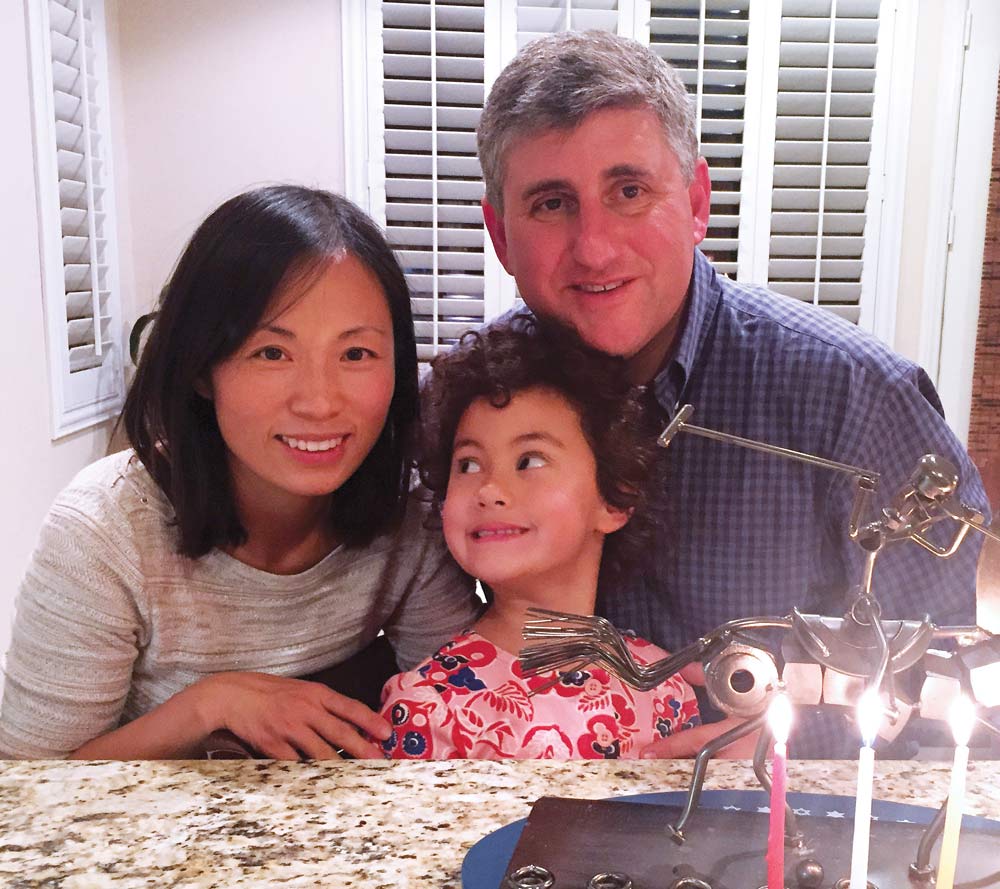
PJ Library books helped fortify Mollie's identity. "'I am Jewish.' She never doubted that," her mother says.
PHOTO COURTESY OF ANNE CHAO
Anne Chao and David Weitz faced a profound question when their daughter, Mollie, was born: How do we raise a Jewish child?
Anne had immigrated to the US from China, and the family lived in San Diego, California, far from the Jewish community David grew up with in New York. Anne craved a stronger understanding of Judaism as she worked to create a Jewish foundation for Mollie. “I didn’t grow up in a Jewish household,” she says, “so it was hard for me to now try to teach my daughter.”
When the family discovered PJ Library through Mollie’s preschool, the task became easier. Anne couldn’t wait to read each book that arrived. “The books showed me the rituals and their meaning,” she says. “On Shabbat, how do you say the blessings? I had no idea. I was able to copy what I learned, then teach my child.”
Not only did the books reinforce the Jewish education Mollie received in her day school, they also helped Mollie understand — on a deep level — who she is. “The books gave her a lot of confidence for a child who’s growing up in an interracial family,” Anne says. “She grew into Judaism seamlessly. The books really built a concept of her identity: ‘I am Jewish.’ She never doubted that.”
Mollie, now 11 and a PJ Library alum, recalls how her family used the books to rehearse for upcoming Jewish holidays. After reading a book about Hanukkah, for example, they practiced cooking fried foods and spinning the dreidel. “PJ Library had a big impact on me because it would teach me about my culture and religion and how I could celebrate it,” Mollie says. “It helped us learn as a family.”
To this day, the family’s collection of PJ Library books serves as “an easy-to-reference encyclopedia of Jewish values and traditions,” which Anne says she revisits throughout the year.
“Raising a child and building a sense of Jewish community takes a village,” David says. “PJ Library is that Jewish village that we get to tap into.”
New Jewish Rituals
A few days had passed since Sage Ungerleider and her daughter, Eleanor, had plopped down on the couch together to read Saturdays Are Special, a PJ Library picture book chronicling a young girl’s Shabbat activities. They were at home in the kitchen when the 4-year-old piped up.
“Out of the blue, she came up to me and said, ‘I want to light Shabbat candles,’” Sage recalls. “I said, ‘OK!’ I didn’t realize she was so taken with the book.”
It was a moment of joy and pride for Ilene Ungerleider, Sage’s mother and Eleanor’s grandmother, who signed up all five of her grandchildren for PJ Library after learning about the program from an ad on a matzah box at Passover years ago. “I totally believe in the power of books,” says Ilene, who worked in an elementary-school library and lit Shabbat candles with her children as they were growing up. “I love so much about Judaism. I want my grandchildren to have a connection to the faith I value so much.”
For Eleanor, that connection is strengthened every time a new PJ Library book arrives in the mailbox. “She opens the envelope by the time we get back to the house and wants to read the book right away,” Sage says. “She has read all the books she’s received more than once.”
The Harvard, Massachusetts-based family made blintzes after reading Mr. Mintz’s Blintzes. When they read Miriam and the Sasquatch, Sage and Eleanor enjoyed sounding out the blasts of the shofar. But Saturdays Are Special has made the longest-lasting impression: The book inspired a new, weekly Jewish ritual.
On Fridays, Sage has started baking challah. She and her husband, Nathan, gather Eleanor and their 1-year-old son, Gabriel, in the evening. Together, they light the candles — using the same candlesticks Sage grew up with — and recite the blessing (Eleanor is still learning the words).
It’s a mirror of Sage’s own childhood, reflecting the same Jewish traditions for her children.
“[Judaism] feels like an important part of me and, by extension, them,” she says. “We really appreciate getting the books every month. It’s nice to have this built-in Jewish education.”
A Catalyst for Connection
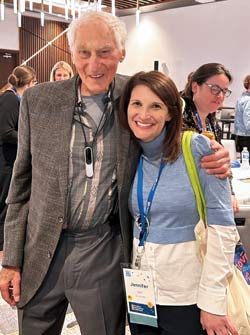
Jennifer Baer and PJ Library founder Harold Grinspoon at the 2023 PJ Library International Conference.
PHOTO COURTESY OF JENNIFER BAER
Jennifer Baer’s face lights up when she recounts the story of two PJ Library families she connected in St. Louis, Missouri, early in the COVID-19 era. For Purim, Baer had paired families around the city to trade mishloach manot (gift baskets of food and treats). Families met their assigned partners for a driveway exchange.
The encounter sparked a friendship between two families in particular. They began attending PJ Library events together, then a local Tot Shabbat program. Eventually they spoke with a rabbi about joining a synagogue. “That initial meeting paved the way for something much more significant,” Baer says.
Baer loves helping families connect to each other and to the larger Jewish community. In fact, it’s her job. As director of PJ Library and family engagement at the Jewish Federation of St. Louis, Baer is one of hundreds of professionals in communities around the world who bring PJ Library families together to engage with one another and Jewish life. Baer and her team organize PJ Library programs and host holiday celebrations and events — in parks, ice cream parlors, museums, and more — meeting families where they are (literally and figuratively!) to help them feel part of a warm, welcoming Jewish network.
“Originally I would describe PJ Library as a book program, but now I describe it as a family engagement program that uses books as one of its many tools,” says Baer, who has been a PJ Library professional since 2008. “PJ Library serves as a real catalyst for deeper, more meaningful interactions.”
The result? Baer and her team of parent connectors have built relationships with thousands of local families. About half of all Jewish children in St. Louis have become PJ Library subscribers. PJ Library activities have boosted enrollment at local Jewish day schools and spurred collaboration across Jewish institutions. Says Baer, “It’s been truly transformational in our community.”
“PJ Library books and programs continue to evolve as families’ needs evolve,” she shares. “The goal is that every Jewish family feels seen and valued.”
A Home for Jewish Narratives
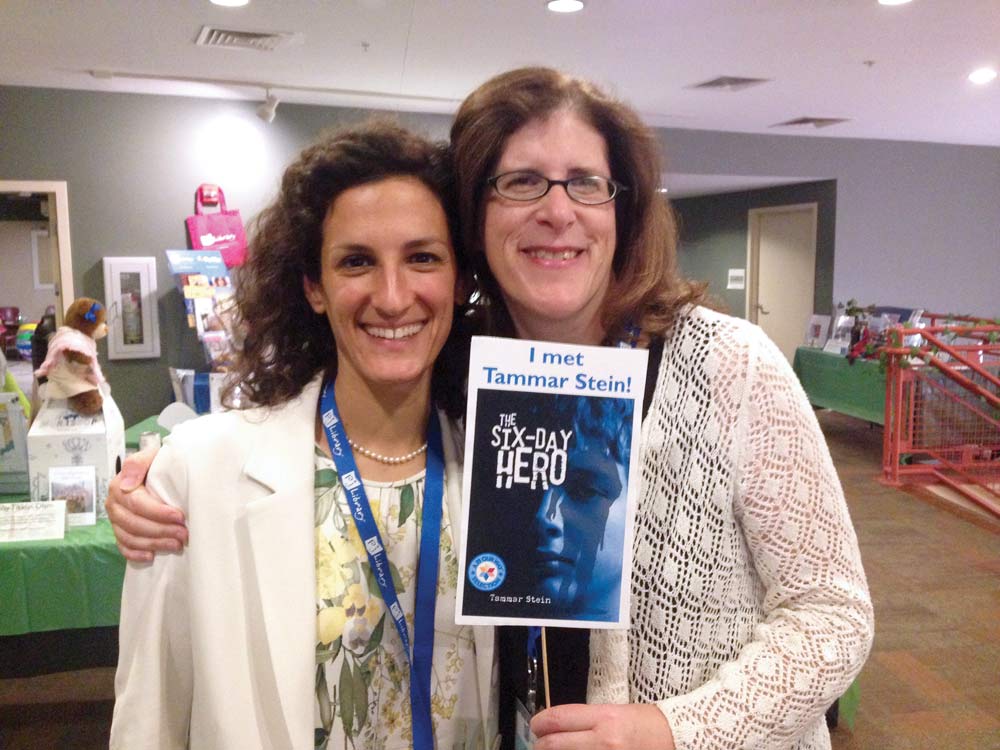
Author Tammar Stein didn’t know if The Six-Day Hero would “see the light of day” until she met PJ Library’s Catriella Freedman.
PHOTO COURTESY OF TAMMAR STEIN
In 2016, Tammar Stein’s career as an author was in full swing. She had already published four young adult novels, garnering acclaim and a flurry of awards.
Yet the book she longed to write next was more personal, and more proudly Jewish, than anything she’d written before: a gripping tale of a preteen boy’s quest to aid his family during Israel’s 1967 Six-Day War. Stein’s father was an Israel Defense Forces (IDF) officer, and she drew on family lore to craft her story.
Stein’s publisher, however, shied away from the material — the topic seemed too niche for a mainstream audience. Would her manuscript find a home?
That’s when Stein met Catriella Freedman, PJ Library’s director of author and illustrator stewardship. Freedman read Stein’s draft, offered feedback, and encouraged her to refine the story for PJ Library’s preteen readers in the PJ Our Way program. “Catriella and PJ Our Way were hugely instrumental in getting The Six-Day Hero published,” Stein says. “Having that relationship with PJ Library helped me see a clearer pathway to publication.”
After completing The Six-Day Hero, which was published by Kar-Ben Publishing and went on to receive a Sydney Taylor Book Award silver medal, Stein began work on a sequel: Beni’s War. PJ Library awarded her an author incentive grant that funded a crucial research trip to Israel. The sequel won a Middle East Book Award.
“I feel very passionate about my Jewish identity and that children need excellent books to engage them,” says Stein, whose two children received PJ Library books before her own novels were brought into the program. “Before PJ Library came into my life, I would try to keep my books balanced and not focus too much on purely Jewish content. The impact that PJ Library has had on my career is that it opened up my ability to write about very Jewish topics. My book could be about Israeli history; it could be about a minor Jewish holiday. It now makes sense for me as a creator to focus my attention and energy in this way.”
A Market for Jewish Books
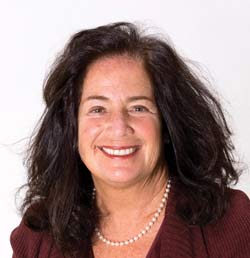
Publisher Joni Sussman has watched PJ Library grow.
PHOTO COURTESY OF JONI SUSSMAN
When Joni Sussman, publisher at Kar-Ben Publishing, first met PJ Library founder Harold Grinspoon and learned that he planned to send free Jewish-themed children’s books to families across the US, the idea sounded ambitious. It was 2005, and Jewish children’s literature attracted an enthusiastic-but-small audience.
Kar-Ben, an imprint of Lerner Publishing Group, exclusively publishes Jewish-themed children’s books and had found a comfortable readership through Jewish bookstores and online sales. But a Jewish book was considered a bestseller if it sold 5,000 copies, Sussman recalls. Most young Jewish readers remained untapped. Could PJ Library, then a small startup based in Western Massachusetts, awaken a larger market?
Under Sussman’s leadership, Kar-Ben supplied many of the first titles PJ Library distributed. At first, PJ Library ordered copies of each book for 20 or 50 children. As the program expanded to new communities, orders grew to 100 copies, then 500 copies, then 1,000 copies. When orders began exceeding 5,000 copies, “we were astonished,” Sussman says. “PJ Library informed many families that there was such a genre as Jewish children’s books. It opened a lot of doors that we were unable to reach as publishers.” (PJ Library’s book orders now top 30,000 copies!)
And the impact of this increased awareness? The number of publishers creating high-quality Jewish children’s books has ballooned.
“PJ Library has changed the world of Jewish children’s books — there’s no question about it,” Sussman says. “When PJ Library first started out, Kar-Ben was virtually the only Jewish children’s book publisher in the US. Now there are several, thanks in part to PJ Library. PJ Library raised the profile and created a market for Jewish children’s books.”
Seeing the demand generated by PJ Our Way (PJ Library’s extension program for preteens ages 9-12), Kar-Ben and other publishers have also made an extraordinary investment in Jewish middle-grade books and graphic novels. “It has encouraged me to produce those books knowing that PJ Library might be a market for them,” Sussman shares.
Sussman marvels at the way PJ Library has transformed the publishing landscape and enriched the Jewish literary canon. “The future looks very, very bright,” she says.
Nurturing Powerful Moments
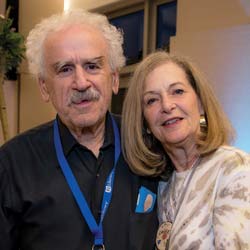
Walter and Arnee Winshall have supported PJ Library for 18 years.
PHOTO BY MICHELE CARDAMONE PHOTOGRAPHY
Arnee Winshall was on the board of the Harold Grinspoon Foundation (HGF) when Harold Grinspoon first presented the idea for PJ Library in 2005. As a longtime advocate for Jewish education with a professional background in early-childhood language acquisition, she saw its potential at once.
“The minute Harold introduced it, the power of the idea immediately struck me,” she recalls. “The whole idea of bringing Jewish books into the home, into the hands of parents, and having families pass Jewish knowledge on to their children — it really resonated with me.”
Arnee and her husband, Walter Winshall, have been ardent supporters of PJ Library since day one. As a board member, Arnee helped brainstorm ways to launch the program. The Winshalls helped bring PJ Library to Boston, participating in the funding of the pilot and making key connections at JCC Greater Boston. Later, Arnee traveled to Israel with the HGF board to explore how to start Sifriyat Pijama, PJ Library’s Israeli counterpart. Arnee and Walter watched (and helped!) as Harold tirelessly recruited donors to grow and expand the program.
“Promoting education is important. This is a Jewish idea going back centuries,” Walter says. So when Harold in 2013 created the PJ Library Alliance, a foundational circle of philanthropists who bolster PJ Library’s work, “We immediately said, ‘We’ll participate,’” he recalls. They have been Alliance partners ever since.
“Our gifts have been made in appreciation for all the ways Harold strengthens Jewish life and living and in recognition of PJ Library’s entrepreneurial vision,” Arnee says. “If a challenge comes up, they figure out how to solve it. We need more Jewish books? Let’s train authors. We can’t get enough books published? Let’s create our own publishing imprint.”
It’s especially important to Arnee to fund PJ Library’s work so the books remain free, to “welcome young families into the Jewish community with a gift,” she says. “The kinds of moments PJ Library creates are so powerful. We have a whole generation of kids linked by the stories they grew up with and a shared feeling of belonging to Am Yisrael, the Jewish people.”
After 18 years of support, the Winshalls are looking ahead. “How far can we go?” Walter muses. “There’s plenty to do.”